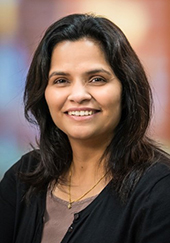Breast Pathology Fellowship
The Breast Pathology Fellowship is a one-year, non-ACGME program is designed for trainees pursuing an academic career in diagnostic breast pathology. Clinical material is obtained from the UCSF Carol Franc Buck Breast Care Center and from numerous extramural confirmatory and challenging consultation cases. Successful applicants will have completed an accredited anatomic pathology or combined anatomic/clinical pathology residency program. Prior completion of a surgical pathology fellowship is a bonus but not required.
Clinical Training and Responsibilities
The fellow will complete clinical rotations managing in-house subspecialty breast biopsies and surgical cases, as well as confirmatory and complex consultation breast cases, in conjunction with faculty. Opportunities for graduated responsibility, including mock sign-out, are incorporated into the training plan. The fellow will additionally gain experience in diagnostic molecular breast pathology, including interpretation of HER2 fluorescence in situ hybridization (FISH) assays and targeted DNA sequencing panels in breast cancer. The fellow will participate in weekly breast tumor board conferences and radiologic-pathologic correlation conferences, as well as weekly molecular tumor board conferences when breast cases are presented.
Research
Dedicated time will be reserved for participation in clinical and translational research projects in breast pathology. The fellow will be mentored in design and conduct of a research project that can be individually tailored to personal interest and expertise. Successful projects will be submitted for presentation at national meetings and prepared for peer-reviewed publication.
Teaching
Teaching responsibilities include helping to teach gross and microscopic breast pathology to residents rotating on the breast pathology service, assisting in running weekly consensus and teaching conferences at the microscope, and helping to build a digital archive of breast pathology teaching cases. Opportunities for medical student teaching are also available if interested.
Faculty Involved with Fellowship
Ronald Balassanian, MD
Professor
Yunn-Yi Chen, MD, PhD
Professor
Ana Quiroga, MD
Professor
Poonam Vohra, MD
Professor
Julia Ye, MD, PhD
Assistant Professor
Molecular Pathology Faculty Involved with Fellowship
Patrick Devine, MD, PhD
Medical Director
James P. Grenert, MD, PhD
Professor
Deepika Sirohi, MD
Associate Professor
Requirements
To qualify candidates must have successfully completed an ACGME-accredited residency in anatomic pathology (AP-3), or anatomic and clinical pathology (APCP-4).
Candidates must have an unrestricted California medical license issued by the Medical Board of California before their start date.
Duration
12 months with a start date of July 1.
Salary, Benefits, & Policies
Fellows will be appointed as a PGY-5.
Please visit the UCSF Office of Graduate Medical Education's Prospective Residents & Fellows Overview webpage for more information.
- Salary and Benefits for UCSF Residents & Fellows
- Contract example for non-ACGME programs
- GME Policies
Application
To apply, please submit the following in PDF format:
- College of American Pathologists Resident Forum's (CAP) Standardized Pathology Fellowship Application
- Curriculum Vitae
- Personal Statement of Interest
- A photo of yourself in JPEG or PDF format.
- Three letters of recommendation should be sent directly from your recommenders and or program coordinator, also in PDF file format.
All application materials are to be submitted in a PDF file format via email to the Fellowship Program Administrator, Thongdam Pathoumthong.
We encourage and welcome all qualified applications to the Breast Pathology Fellowship Program. This program is open to all who meet academic, professional, and interest criteria. In accordance with Federal and State law and University policy, the University of California does not discriminate on the basis of age, gender, race, ethnicity, national origin, religion, sexual orientation, gender identity, health, or disability. For detailed information, please visit the Office for the Prevention of Harassment and Discrimination.
Important Dates
| 2027-2028 Cycle |
|---|
| Accepting Applications |








